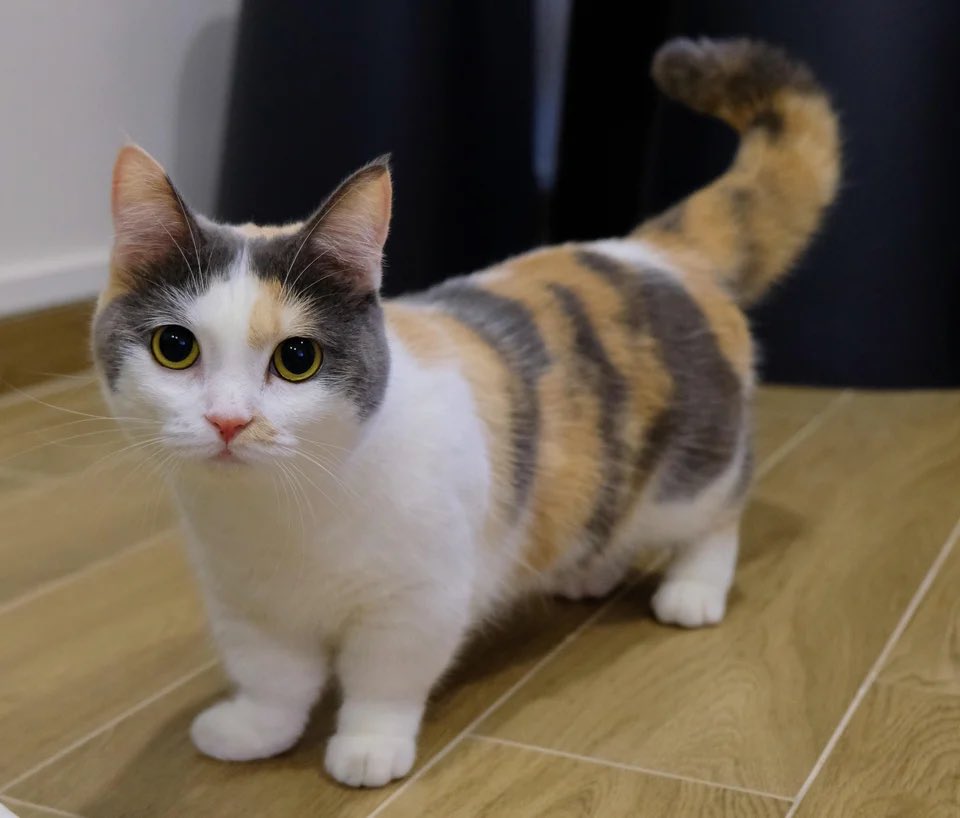Have you met a Munchkin cat? Not only does it have an adorable name, this impossibly cute cat has very obvious short, stubby legs, and large eyes that can capture the hardest of hearts.
Related: Understand the local stray cats in your HDB
Here are some facts to know about this adorable breed:
Quirky habits of the Munchkin
Remember Puss in Boots from Shrek who walks on two legs? He’s based on a Munchkin cat because the breed can often be found sitting/standing up on their hind legs! This is because they’re extremely curious and will sit like that to get a better view of something that has caught their attention. Munchkins are so curious, they leave no stone unturned or corner unexplored.
Another quirky thing they like to do is steal and horde shiny little objects away – this is why some people compare them to magpies (birds who steal and horde shiny objects). These adorable thieves have been known to steal and stow away things like jewellery.

Munchkins come in many patterns and colours
Most Munchkins are of the plush, short-haired coat variety, while long-haired varieties have semi-long silky fur. Apart from the characteristic short legs, a Munchkin looks like a typical small-to-medium-sized cat and comes in all coat lengths, colours, and patterns due to outcrossing (crossing with different breeds).
Much like your neighbourhood cats, popular coat shades and patterns are tabby, calico, gray, and solid black. The Munchkin has also been crossed with a variety of cats to create rare, new breeds, including:
The Skookum (bred with curly-coated LaPerm):

The Bambino (bred with the hairless Sphynx):

The Lambkin (bred with the densely curly-coated Selkirk Rex):

The Napoleon (bred with Persian breeds like Himalayans and Exotic Shorthair):

The Scottish Kilt (bred with the folded-eared Scottish Fold):

The Genetta (bred with spotted Bengal):

The stubby-legged Munchkin trait is so desired that there are more sub-breeds of Munchkins out there, most of which are newly introduced.
Their traits and personality
Munchkins are sociable cats which are extremely playful and have an insane amount of energy; much like other cats, they have a knack for speed and agility. Despite their short legs, they can often be seen dashing around and cornering tightly in whatever game they’re playing. Even though they’re low to the ground, they’re capable of jumping – albeit not as high as longer-legged cats.
With a lifespan of around 12 to 15 years, Munchkins offer a great deal of love to offer their owners, and love spending time snuggling up to their humans when they’re not busy playing and running around. They’re extroverts who love company, including children, dogs, and other pets.

The breed with a gene anomaly
Like many unusual cat breeds, the short legs of the Munchkin breed (which was first documented in the 1940s) arose from a spontaneous genetic mutation which causes the long bones in a cat’s legs to grow shorter. Their front legs may bow slightly and the hind legs are slightly longer than the front, making their backs slope slightly down. Interestingly, if two Munchkins mate, their “lethal” genes will actually kill the embryo – so only one Munchkin-gene parent is needed to produce healthy, stubby-limbed kittens.

Officially recognised as a breed only in 1993, some cat associations don’t recognise the Munchkin as some believe their breeding is unethical, as it encourages deformities. However, Munchkins are a relatively healthy breed, aside from their slightly funny walk and short jump range.
However, not all Munchkin cats have short legs – there are three different heights. The “standard” category includes Munchkins not born with the heterozygous gene, so they have regular-length legs. “Super-short” is means moderately short legs, while “rug hugger” Munchkins have the shortest legs.












